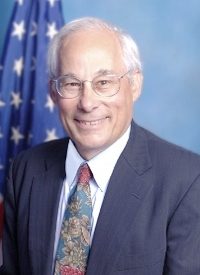
Forty-two Republican senators sent a letter to President Obama asking him to withdraw his nomination of Donald Berwick (pictured, left) to continue as head of the Centers for Medicare and Medicaid Services (CMS).
In light of the letter sent by GOP lawmakers, Democrats see there is no possible way that Berwick’s nomination could garner the 60 votes needed for confirmation by the Senate. Should Berwick’s appointment not receive the necessary Senate approval, he would have until the end of the year to vacate his office.
As reported by this author in July 2010 in The New American, Berwick received a recess appointment to his current position and in January of this year he was renominated by President Obama.
While news about the fate of the director of the CMS may not have the pizazz of a trip to Rio de Janeiro or an in-depth analysis of the Presidents NCAA Basketball Tournament bracket picks, it is much more crucial to the future of citizens of this country than either of those more scintillating stories.
At The New American, we have covered this story since the days leading up to the recess appointment. Despite his impressive professional credentials, Dr. Donald Berwick has one fatal flaw: his Anglophilia. This unhealthy love for the U.K.s National Health Service is evident in the following quote published last year in the National Review online:
In speeches and articles celebrating the 60th anniversary of Britain’s National Health Service in 2008, Dr. Berwick said, I am romantic about the NHS; I love it. All I need to do to rediscover the romance is to look at health care in my own country. He not only loves it, he says it is an example for the whole world an example that the United States needs now.
The shortcomings of the NHS are legendary (or notorious), and evidently Dr. Berwick was unable to gild that lily despite his years of fervently trying. As cited by J.R. Dunn, the author of Death by Liberalism:
As is often the case with ex-girlfriends, there were a lot of blemishes that Berwick has chosen to overlook. Blemishes including filthy, uncleansed wards, the worst iatrogenic infection rate in Europe (Staffordshire hospitals alone recently lost over 1,200 patients to the hospital-borne staph infection MRSA), months- if not years-long waits for everyday operations, and a deteriorating survival rate for cancer, cardiac, and stroke patients. To these benefits we can add the Liverpool Care Pathway (LCP), which cuts off certain select patients from food and water while loading them up with sedatives in order to free up the beds.
And:
The most telling statistic concerning the NHS is the number of accidental hospital deaths per year: 95,000. This is the highest in Europe and twice that of the U.S. which has six times the population. To put it into perspective, let’s reverse the ratio to see how many accidental deaths the U.S. would have with an NHS-type system. The answer is 450,000 per year.
However, Berwick has more than just the NHS in mind when he fawns over the U.K.s health care model.
Further evidence of Berwick’s Anglophilia is found in statements he made lauding Britain’s National Institute for Clinical Excellence (NICE). NICE is the British agency tasked with deciding which medical treatments and technologies will be pursued and promoted in the United Kingdom and which will be discarded and denied to the British public in the name of efficiency.
Berwick, as head of CMS (the agency that will mimic in the United States much of the discretionary functions of NICE), once wrote that NICE has “developed very good and very disciplined … models for the evaluation of medical treatment from which we [the United States] ought to learn.”
This is an interesting endorsement considering that according to a recent study published in the respected medical journal Lancet Oncology, the five-year cancer survival rate in England is 45 percent compared with 66 percent in the United States. The difference when taking only women into account is 53 percent in England, 63 percent in the United States. What about that sort of stark statistic does Dr. Berwick find so desirable? Perhaps it is the fact that as a result of his management we will perhaps be able to remove 10 percent of cancer patients from the ledger books, thus accomplishing the raison d’tre for the glorious program of rationing treatment so beloved by him and his boss.
Beyond his grossly misplaced fascination with British bureaucratic health care rationing, there is the stigma attached to Berwick of being what the executive director of the National Right to Life organization, David Osteen, describes as a “one-man death panel.”
“President Obama’s appointment of this open advocate of rationing to implement his health care law underlines the need for repeal before untold numbers of vulnerable Americans suffer death from denial of life-saving treatment,” Osteen stressed.
Regarding the single-payer, government-managed health care system, Donald Berwick, with evangelical fervor, once described such a scheme as the Holy Grail of universal coverage. He then went on to warn the United States that such a lofty and laudable goal could not be achieved with consumer-centered health care, but only through collective action overriding some individual self-interest.
As if all the foregoing comments weren’t enough to convince 42 senators to send that letter to the White House, Berwicks comments during a 2009 interview with a medical journal no doubt screwed their courage to the sticking point: The decision is not whether or not we will ration care the decision is whether we will ration with our eyes open.
Now, barring any Chicago-style misdirection and sleight of hand, or osteoporosis in the legislative backbone, Donald Berwicks time at the CMS, as well as his quest to import British medical mismanagement and death panels to the United States, is all but dead and buried.



